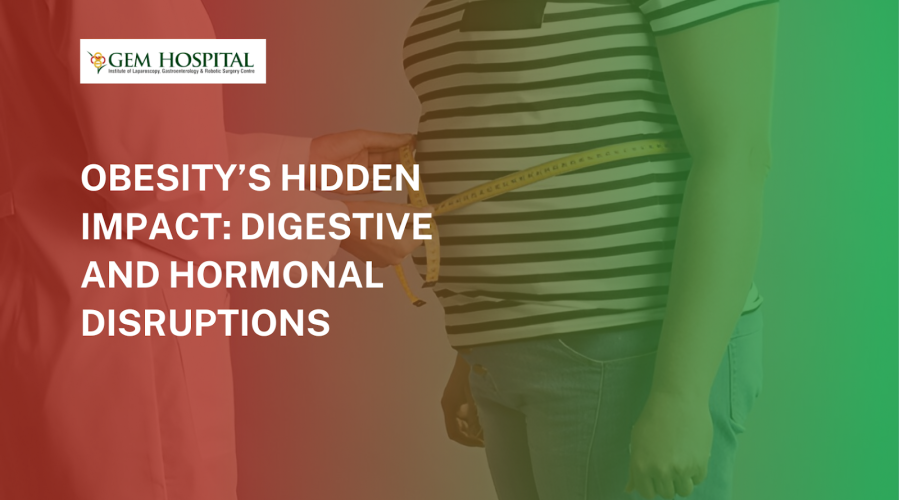Consult experienced hernia doctors in Chennai for expert surgical care. Advanced diagnosis, safe hernia surgery, and faster recovery with specialized treatment.
Obesity Isn’t Just About Weight – How It Triggers Hidden Digestive and Hormonal Damage

When most people think of the word "obesity," they often think of body weight or appearance. But obesity is much more than a number on a scale; it is a complex metabolic phenotypic state that impacts almost every organ system of the body. The hormonal effects of obesity, especially as it relates to digestive health, can remain hidden and unrecognized until it causes serious complications.
Beyond Calories: The Endocrine Disruption of Obesity
The body depends on a finely tuned endocrine system to manage every aspect of human health from appetite and moods to blood glucose and reproductive health. When excess fat accumulates (particularly visceral fat - fat surrounding organs), it does not simply sit idle, it is metabolically active.
Fat is an energetic tissue that excretes substances called “adipokines” and inflammatory “cytokines” that disrupt hormonal balance. This is the beginning of the hormonal effects of obesity.
1. Insulin Resistance and Diabetes
The most famous hormonal effect of obesity is insulin resistance. Fat tissue has a negative impact on how the body deals with insulin and causes blood sugars to remain in the blood longer instead of using it, leading to the onset of type 2 diabetes over time.
The worst part? Insulin resistance alters how our bodies store fat, making it difficult for you to lose weight, and you find yourself in a hormonal cycle worse.
2. Leptin Resistance: The Hunger Hormone Gone Wrong
Leptin is a hormone produced by fat tissue that tells our brains when we are full. The more fat you have, the more leptin you make. Ironically, in obese individuals, the brain loses sensitivity to leptin's signal and it is termed as Leptin Resistance.
This means we continue to feel hunger prompting overeating, additional weight gain, and further hormonal disruption.
3. Disrupted Sex Hormones and Reproductive Issues
Obesity can drastically impact reproductive hormones. For women, excess fat can lead to higher estrogen levels, which can contribute to polycystic ovary syndrome (PCOS), irregular periods, and even infertility.
For men, higher fat levels can lead to decreased levels of testosterone, decreased libido, erectile dysfunction, and decreased muscle mass.
4. Cortisol and Chronic Stress
Obesity correlates with excessively high levels of cortisol, the body's stress hormone. This is problematic because not only does high cortisol promote belly fat storage, it can also affect sleep quality, sugar cravings, and increase insulin resistance. This begins a hormonal feedback loop that further complicates weight management.
The Hidden Link: How Obesity Affects Digestion
While hormonal imbalance is a major concern, obesity also silently harms the digestive system.
1. Increased Risk of GERD and Acid Reflux
Abdominal fat pushes on the stomach, which can push acid upwards into the esophagus. This intermittent reflux can worsen into gastroesophageal reflux disease (GERD), which is common but can be very dangerous if left untreated. In fact, chronic reflux can even increase your risk of esophageal cancer.
2. Gallbladder Dysfunction
Obesity increases cholesterol concentration in the bile. This leads to a higher likelihood of gallstones, which can block bile from flowing, causing gallbladder inflammation. You may have to consider surgical removal of the gallbladder altogether.
3. Fatty Liver Disease
The likelihood of developing non-alcoholic fatty liver disease (NAFLD) is extremely high if you are obese. This disease can progress to liver fibrosis, cirrhosis, or liver failure, without any symptoms in the beginning.
4. Gut Microbiome Imbalance
Studies show that obesity changes the gut microbiome of the bacterial community living in your gastrointestinal tract and these changes not only lead to more inflammation and nutrient absorption problems but also contribute to the hormonal effects of obesity, potentially creating a cycle of further weight gain.
The Domino Effect: How Hormonal and Digestive Damage Work Together
The hormonal effects of obesity and digestive disorders are not isolated they fuel each other.
- Poor digestion affects nutrient absorption, which affects hormone production.
- Hormonal imbalance can slow down gut motility and increase fat storage.
- Inflammation from digestive issues can worsen insulin resistance.
It’s a domino effect where one system affects the other, making it crucial to address obesity not just for weight loss, but for total body health.
Address the Root Cause – Not Just the Symptom
Have you been struggling with obesity? It's time to stop counting calories, following fad diets and suffering. The hormonal impact of obesity is very real, deep seeded and affects everything from your gut health to your reproductive health and mental health.
At GEM Hospital, we not only treat the symptom or situation, we treat the whole metabolic picture - evaluation, diagnosis and treatment are just a part of the process. Taking control of your health isn't easy, but it can be done with our multidisciplinary team helping you along the way.
Book your appointment today with GEM Hospital and take your first step towards your hormonal health, gut health and wellbeing for the long term.
Blogs & Article
Get advanced liver transplant treatment in Chennai with expert surgeons, modern technology, and comprehensive care for safe and successful outcomes.
Get advanced piles treatment in Erode with expert doctors. Safe procedures, modern technology, and effective care for fast relief and recovery.


